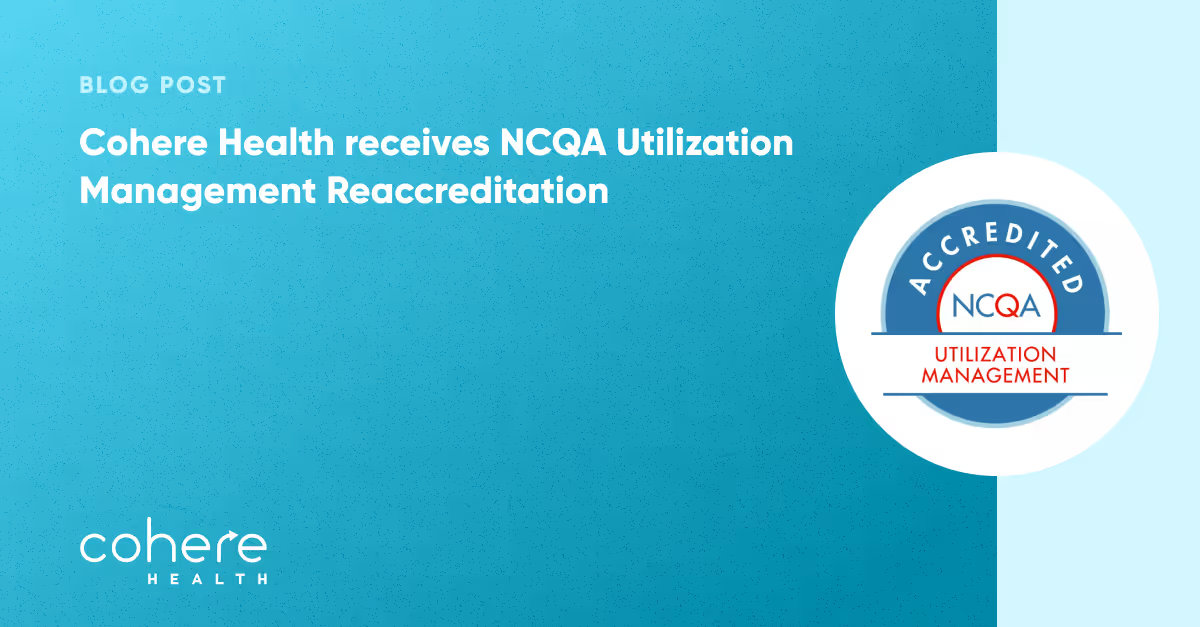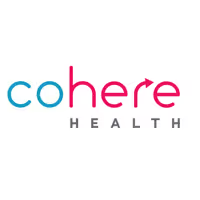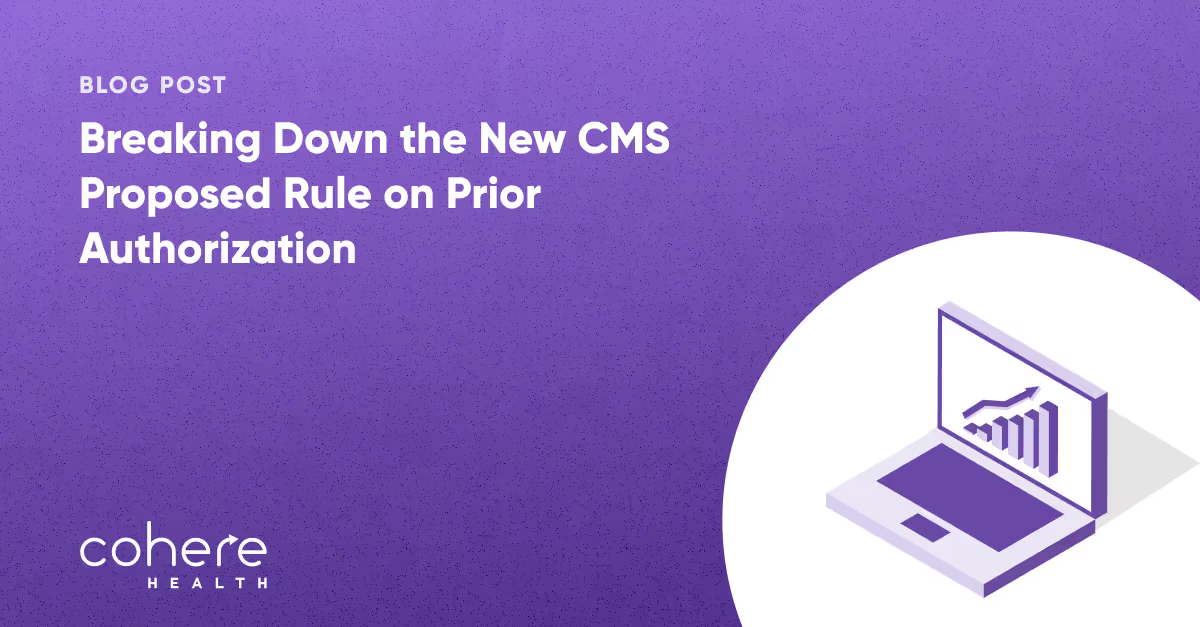How Cohere Health is ushering in a new era of provider experience
Published:
September 27, 2024
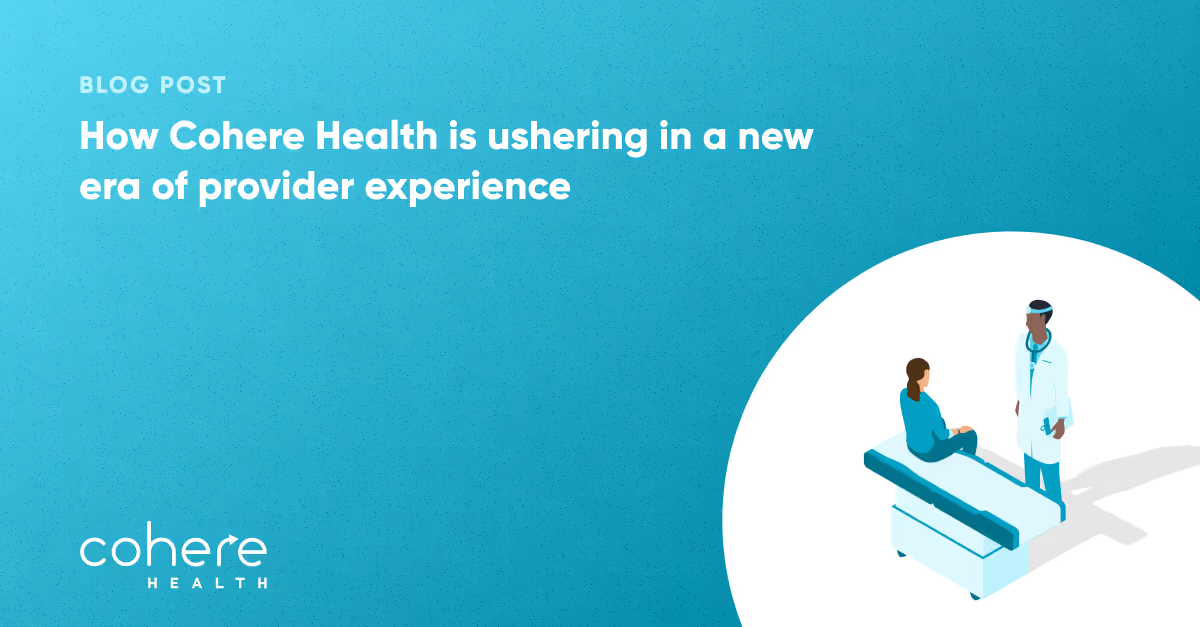
When you have a history of good credit, you get a better mortgage rate. When you consistently accrue enough frequent flyer miles, the airline rewards you with a better travel experience. One major problem with legacy prior authorization is the uniform process for all providers, without consideration for the variation in consistency and quality of providers.
A shocking 94% of physicians reported delays in care due to the prior authorization process. The Cohere approach offers the market an alternative model that creates pathways to yes for high-performing providers and supports those not hitting benchmarks.
This approach, known as green lighting, leverages Cohere’s industry-leading platform to understand:
- Evidence-based quality measures
- Past performance data
- Practice patterns and outlier analysis
Cohere is flipping the script on the uniform treatment of providers by using real-time advanced analytics to dynamically tune the experience of each provider and deploy the right quality interventions at the right time for the right providers.
What about gold carding as a solution to reward high-performing providers?
Some states and healthcare systems have embraced “gold carding” to try to remedy this problem. Gold carding involves waiving or reducing prior authorization requirements for physicians with a track record of delivering high-quality health care. Typically, physicians with a 90% approval rate for certain medical services in the preceding six months to a year qualify for gold card programs, thereby earning a pass from traditional prior authorization processes.
Early adopters of gold carding were excited about its potential to create a more tailored process where high-performing providers get a faster prior authorization experience. However, an AHIP survey showed gold carding has a mixed success rate.
- 33% found gold carding challenging to put into effect due to administrative difficulties
- 20% found gold carding reduced care quality or caused “performance slippage”
- 20% found gold carding resulted in higher costs without improved quality
One limitation of gold carding is that it analyzes and categorizes physicians into broad programs based on data as old as six months. It cannot conduct safety checks or suggest alternative sites of care, such as when surgery can be done in an outpatient setting. While there is a place in the market for this lever, there is a better approach.
Enter the green lighting era
A data-driven alternative to gold carding called “green lighting” has emerged as a more efficient and flexible solution to the prior authorization dilemma. Green lighting utilizes real-time, physician-specific, and code-specific data to enable eligible physicians to avoid prior authorization requirements while maintaining quality and cost control.
Physicians with high prior authorization approval rates and high performance against quality and appropriateness measures based on best standards and guidelines from medical societies are guided along a notification path where approval is unnecessary; they only need to express their intention to perform the service and fill in the core details of the authorization.

The impact of Cohere’s fast approach
Green lighting helps make the prior authorization process more efficient and less abrasive for physicians. It uses a more collaborative approach between health plans and physicians so patients receive more timely care.
Early studies from our approach have shown, for example, that green lit providers will see an 18% improvement in real-time approvals from baseline while saving 44% of the time typically spent on submission.* 81% of providers have shared that submitting with Cohere takes five minutes less on average than other platforms. That means Cohere saves provider offices fifty-two million minutes or ninety-nine years annually while increasing speed to care with real-time approvals.
Key advantages of green lighting top providers include:
- Patient safety first: Green lighting creates a real-time path to yes, but only after checking for safety and running contraindication checks. For all green lit providers, ongoing monitoring and analysis occur in the platform so that if there is a variation in behavior, adjustments are made instantaneously. This reduces concerns found in gold carding programs and reduces the risk of gaming the system.
- Speed to care: Green lighting speeds up prior authorization by reducing administrative burdens for physicians and health plans and results in faster patient access to care.
- Configurable and analytics-driven: The Cohere platform deploys provider-focused interventions at scale. This is done first analytically by inputting industry standard quality and appropriateness measures and assessing them against benchmarks and tiering provider performance. Second, it is accomplished by leveraging the in-platform just-in-time nudges and quality interventions dependent on provider performance.
While many providers meet the requirements for greenlighting, those who do not are engaged in a thoughtful and collaborative manner.
Unlike the traditional “on or off switch” seen with gold carding, Cohere’s platform enables different tracks at the provider and procedure level, delivering a highly customized prior authorization process tuned to ensure the highest quality care for patients is received while minimizing provider abrasion.
For example, providers with a low quality and appropriateness benchmark for a specific procedure may see increased education, nudges, and a higher rate of pended cases for that procedure rather than taking the provider off the plan’s gold carding list altogether. This analytics-led approach enables the deployment of a prior authorization process personalized to the providers, removing the abrasion typically applied across providers.
After an Initial evaluation by analyzing performance data and quality benchmarks, the ongoing support process for targeted providers begins. Given Cohere’s platform and deep provider analytics, providers are continuously evaluated, enabling providers to qualify for higher-quality tracks as soon as they meet the threshold.

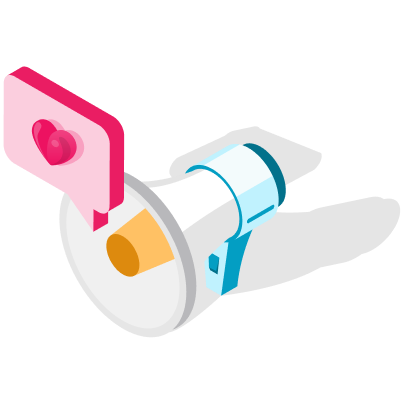
Key advantages of this approach include:
- Provider collaboration: Engaging in partnership with providers in peer-to-peer (P2P) calls, supporting their staff with “nudges” built into submission workflows to help understand medical necessity requirements, consistent policy application, and paths to approvals.
- Program adjustment: Ongoing reassessments of performance as providers adjust behavior and improve performance, as well as ongoing network intelligence and quality consultation
“One of the reasons I joined Cohere Health is to improve prior authorizations and other hassles physicians go through – like peer-to-peer reviews – so that they can spend their time actually helping patients. I love our approach. We assume physicians are trying to get the best care for their patients while managing a demanding job, and we actively look for ways to better support them.” – Dr. Mary Krebs, Medical Director, Primary Care.
The physician-led ethos at Cohere Health focuses on easing the burden placed on physicians in traditionally labor-intensive prior authorization systems. The goal is to both improve their experience and, in collaboration, deliver the highest quality care to our patients.
Who benefits from Cohere Health’s approach?
Providers: Top-performing providers skip the typical red tape, and other providers are empowered to get more accurate determinations.
Patients: Patient outcomes are prioritized when real-time data ensures high-quality care remains central to the authorization process.
Plans: This comprehensive approach drives more accurate, faster, and higher quality care decisions, all while improving provider and member experience. The results are clear.
Partner with Cohere Health to get the prior authorization process back to what it was created to do: ensuring cost-effective, safe, necessary, and appropriate for each patient.
*calculation based on a pilot program with a health plan’s implementation of Cohere Complete™.
Available For Download
Stay ahead with expert insights on transforming utilization management and payment integrity—delivered straight to your inbox.

